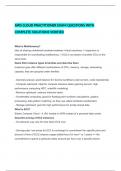Exam (elaborations)
AWS CLOUD PRACTITIONER EXAM QUESTIONS WITH COMPLETE SOLUTIONS VERIFIED
- Course
- Institution
AWS CLOUD PRACTITIONER EXAM QUESTIONS WITH COMPLETE SOLUTIONS VERIFIED What is Multitenancy? Idea of sharing underlined hardware between virtual machines -> hypervisor is responsible for coordinating multitenancy; 1 EC2 is not aware of another EC2 on the same host. Name EC2 instance types...
[Show more]



